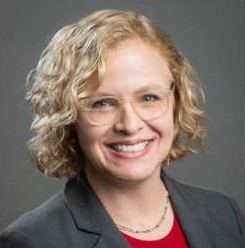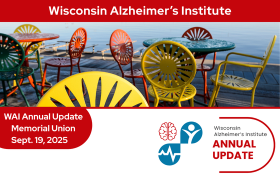
WAI's 23rd Annual Update in Alzheimer's Disease and Related Dementias
Date
Friday, September 19, 2025
Location
Memorial Union, University of Wisconsin‒Madison Campus
800 Langdon Street
Madison, WI 53706
Meeting Room: Great Hall (4th Floor)
Provided by
University of Wisconsin‒Madison Interprofessional Continuing Education Partnership (ICEP)
Conference Format
The format for this meeting is in-person only.
Statement of Need
It is estimated 6.9 million Americans aged 65 and older are currently living with Alzheimer’s dementia, and an additional 5-7 million older Americans may have mild cognitive impairment due to Alzheimer’s disease. It is anticipated the aging baby-boom generation will bring the estimate to 13.8 Americans aged 65 and older living with Alzheimer’s dementia by 2060. Alzheimer's disease is the seventh-leading cause of death in the United States. As a result, there is a heightened need for researchers, healthcare professionals, and policymakers to prevent and address the increasing needs and prevalence of Alzheimer’s disease and related dementia in an aging society.
Conference Overview
This is an annual, in-person event that is designed to improve the diagnostic and therapeutic capability of healthcare providers who care for persons living with Alzheimer’s disease and other dementias. The conference features six research-based presentations that showcase innovative best practices and evolving research efforts.
Intended Audience
This activity is intended for primary care physicians, psychiatrists, neurologists, nurse practitioners, nurses, psychologists, social workers, physician assistants, occupational and physical therapists, researchers, case managers, and other healthcare professionals who diagnose, treat and manage Alzheimer's disease and related disorders in diverse populations.
Elements of Competence
This continuing education activity has been designed to change learner competence and focuses on the following competencies:
American Board of Medical Specialties:
- Medical knowledge
- Practice-based learning and improvement
- Interpersonal and communication skills
- Professionalism
Interprofessional Practice:
- Values and ethics
- Roles and responsibilities
- Communication
- Teams and teamwork
Global Learning Objectives
- Identify cutting-edge approaches to the diagnosis of Alzheimer's dementia and related disorders across diverse communities
- Describe evidence based, culturally-tailored care management strategies for patients with cognitive disorders
- Apply effective strategies to support and engage caregivers of persons living with dementia
Registration Fee
The conference registration fee is $250.
The fee includes the cost of tuition, conference completion report, and a nonrefundable processing fee of $50.
Cancellation and Refund Policy
Requests for cancellation must be submitted in writing to [email protected]. Cancellation requests received at least 96 hours prior to the conference will allow a full refund except for the nonrefundable processing fee of $50. No refunds will be made for cancellations received less than 96 hours prior to the activity start date.
For Further Information
- Meeting content: Jody Krainer, [email protected]
- Registration assistance: [email protected]
Conference Agenda
Friday, September 19, 2025 | |
| AM | |
| 8:00 | Registration and Continental Breakfast |
| 8:30 | Welcome and Opening Remarks Cynthia Carlsson, MD, MS University of Wisconsin‒Madison |
| 9:00 | Blood Biomarkers and Dementia Risk: Clinical Trial Insights Across Population Subgroups Doris Molina-Henry, PhD University of Southern California |
| 10:00 | What Are We Going to Do With Grandma Tina: Managing the Behavioral and Psychological Symptoms of Dementia Helen C. Kales, MD University of California, Davis |
| 11:00 | Break |
| 11:15 | Risk and Protective Factors in Autosomal Dominant Alzheimer's Disease: Findings From the Colombia-Boston (COLBOS) Study Yakeel T. Quiroz, PhD Boston University |
| PM | |
| 12:15 | Lunch |
| 1:15 | New Tools and New Approaches to Fighting Financial Exploitation of Older Adults Peter A. Lichtenberg, PhD, ABPP Wayne State University |
| 2:15 | Teleneuropsychology in Clinical Practice: Current Standards and Future Perspectives Lindsay Clark, PhD University of Wisconsin‒Madison |
| 3:15 | Break |
| 3:30 | Alzheimer's Disease in People With Down Syndrome Sigan L. Hartley, PhD University of Wisconsin‒Madison |
| 4:30 | Closing Remarks Cynthia Carlsson, MD, MS University of Wisconsin‒Madison |
Meeting Room
Meeting Room: Great Hall (4th Floor)
Hotel Room Blocks
DoubleTree by Hilton Madison Downtown
Graduate by Hilton Madison
Conference Presenters
| Cynthia Carlsson, MD, MS Professor of Medicine, Division of Geriatrics and Gerontology Louis A. Holland, Sr., Professor in Alzheimer's Disease Vilas Distinguished Achievement Professor Director, Wisconsin Alzheimer's Institute Clinical Core Leader, Wisconsin Alzheimer's Disease Research Center University of Wisconsin School of Medicine and Public Health Madison, Wisconsin Dr. Cynthia Carlsson is Professor of Medicine in the Division of Geriatrics at the University of Wisconsin School of Medicine and Public Health and Director of the Wisconsin Alzheimer’s Institute in Madison, Wisconsin. Her research focuses on early detection and prevention of Alzheimer’s disease through modification of vascular risk factors. She has received grant support from the National Institutes of Health (NIH), the Department of Veterans Affairs, the University of Wisconsin, and other organizations and has published over 200 peer-reviewed research papers. Dr. Carlsson serves as Clinical Core Leader of the NIH-funded Wisconsin Alzheimer’s Disease Research Center and leads the University of Wisconsin Alzheimer’s disease clinical trials program as a member site in the NIH Alzheimer’s Clinical Trials Consortium (ACTC). She has been a part of state and national initiatives to improve dementia research, clinical care, and services for older adults, including serving as Chair for the US Health and Human Services Advisory Council on Alzheimer's Research, Care, and Services. She continues to see patients with memory loss at the Madison Veterans Affairs Hospital where she has served as a staff geriatrician for over 20 years. |
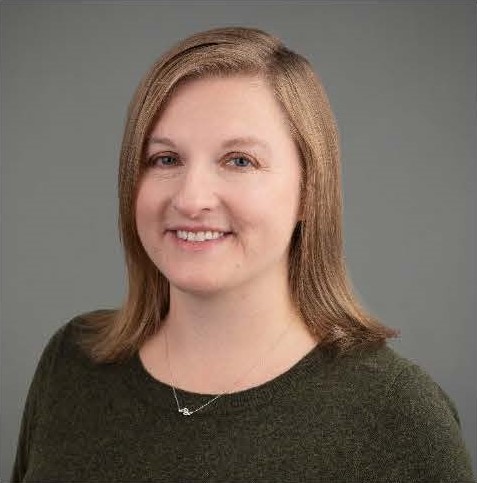 |
Lindsay Clark is a clinical neuropsychologist and assistant professor at the University of Wisconsin-Madison School of Medicine & Public Health and the Madison VA Geriatric Research Education and Clinical Center (GRECC). Dr. Clark leads a research program dedicated to enhancing communication around Alzheimer’s biomarker testing and diagnosis, as well as validating digital cognitive assessment tools to expand access to earlier diagnosis and care. Clinically, she specializes in the diagnosis of memory disorders and provides expertise in teleneuropsychology. |
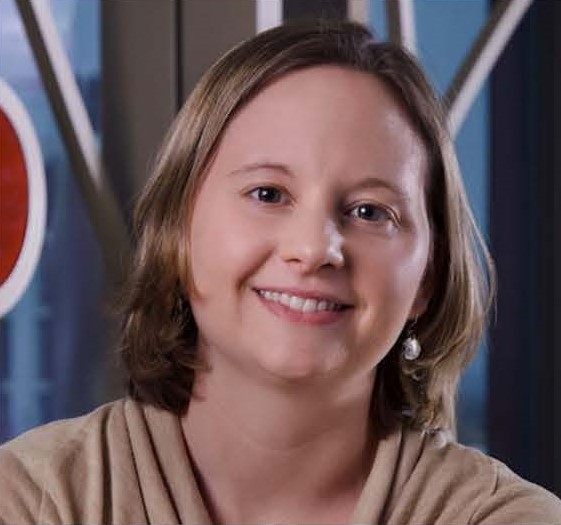 |
Sigan Hartley, PhD, is the 100 Women Distinguished Chair in Human Ecology and Professor of Human Development at the University of Wisconsin-Madison. Dr. Hartley is a clinical psychologist by training. She is part of the NIH-funded Alzheimer's Biomarker Consortium-Down Syndrome (ABC-DS) and Down Syndrome Cohort Development Program (DS-CDP). She also consults with the Global Down Syndrome Foundation and LuMind IDSC Foundation and works in close partnership with Down syndrome organizations in Wisconsin. Dr. Hartley's research is aimed at understanding ways to prevent medical conditions commonly experienced by individuals with Down syndrome, including Alzheimer's disease. She is the past President of Division 33 of the American Psychological Association (APA) and current chair of the Alzheimer's Association International Society to Advance Alzheimer's Research and Treatment (ISTAART) Professional Interest Area on Down syndrome. |
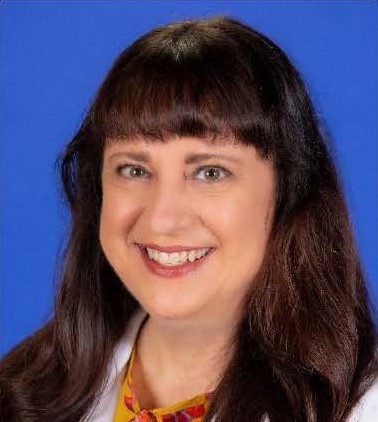 |
Dr. Kales is Chair of Psychiatry and Behavioral Sciences at University of California, Davis. Prior to this, she was Professor of Psychiatry at the University of Michigan and a Research Investigator in the Center for Clinical Management Research and the Geriatric Research Education and Clinical Center in the VA Ann Arbor Health System. She is the founding Director of the UM Program for Positive Aging (PPA), established in 2009, which moved to UC Davis in 2019. As a fellowship-trained, board-certified geriatric psychiatrist, her research program is directly informed by her clinical work and experiences with patients, families, providers, and systems to diminish the barriers to effective and high-quality care for older patients with mental health issues and/or dementia and their caregivers. Dr. Kales is recognized as a national and international expert in outcomes related to later-life depression, the risks of use of antipsychotic and other psychotropic medications in older adults, and in researching ways to improve dementia care. In recognition of her work in the field of dementia care, she was named to the standing Lancet Global Commission on Dementia Care in 2015. Dr. Kales has had continuous federal funding since 2004, serving as principal investigator on 13 federally-funded grants. In her work with junior investigators, she has served as mentor to four faculty with NIA career development funding. |
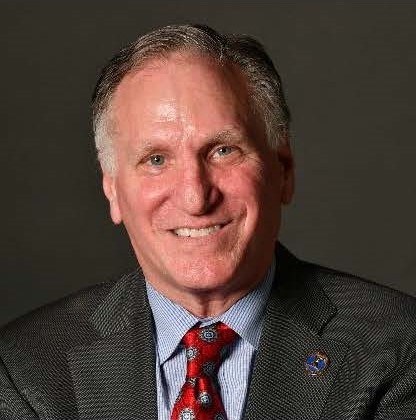 |
Peter A. Lichtenberg, PhD, ABPP, is the former Director of The Institute of Gerontology (1999-2024) and a Distinguished Professor of Psychology and Gerontology at Wayne State University. He received his bachelor’s degree from Washington University in St. Louis, and his master’s and doctorate in Clinical Psychology from Purdue University. After his internship he completed a post-doctoral fellowship in geriatric neuropsychology at the University of Virginia Medical School where he also became a faculty member. Dr. Lichtenberg, one of the first board certified Clinical Geropsychologists in the nation, has made contributions to the practice of psychology across a variety of areas and is a nationally recognized expert in the areas of financial capacity and financial exploitation among older adults and the impact of early memory loss and dementia on financial decision-making, financial exploitation and financial capacity. He has authored 7 books and over 225 scientific articles in Geropsychology. He served as the 2022 President of the Gerontological Society of America and was the 2023 GSA Chairman of the Board of Directors. In 2024 he was named the Donald Kent Award for leadership in gerontology, one of the highest honors given by the Gerontological Society of America. |
 |
Dr. Doris Molina-Henry is a trained neurobiologist and an Assistant Professor in the Department of Neurology at the Keck School of Medicine of the University of Southern California. She is a faculty member at the Alzheimer’s Therapeutic Research Institute (ATRI) and serves as Co-Associate Lead for the Recruitment, Engagement, and Retention Unit of the NIA- and NIH-funded Alzheimer’s Clinical Trials Consortium (ACTC). Dr. Molina-Henry collaborates on initiatives to strengthen recruitment and retention in Alzheimer’s disease clinical trials, with the goal of increasing participation among high-risk populations that have not been adequately reflected in prior studies. Her work focuses on understanding disproportionate enrollment patterns, with particular attention to the influence of co-pathologies and sociodemographic characteristics. This line of inquiry informs her biomarker research, which aims to improve the applicability of early detection strategies across a broader range of clinical trial populations. Building on this work, she serves as Multiple Principal Investigator (MPI) of the Alzheimer’s Plasma Extension Study (APEX), a study examining longitudinal disease trajectories using plasma and cognitive measures among asymptomatic clinical trial volunteers who were ineligible for amyloid-lowering trials. Findings from APEX aim to guide early detection approaches and support the development of interventions that may ultimately delay or prevent the onset of Alzheimer’s disease. |
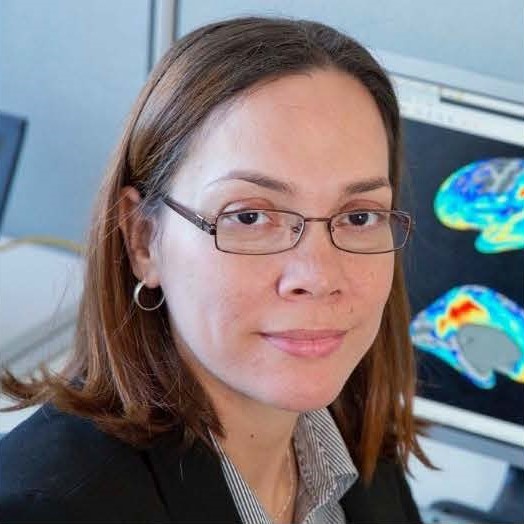 |
Dr. Quiroz is a Professor in the Department of Psychological & Brain Sciences at Boston University, where she leads the Multicultural Alzheimer’s Prevention & Protection (MAPP) Lab. She previously served as Associate Professor of Psychiatry at Harvard Medical School and spent over a decade at Massachusetts General Hospital (MGH) directing innovative clinical and research initiatives. Dr. Quiroz earned her MA in cognitive neuroscience and PhD in clinical psychology from Boston University and completed specialized postdoctoral training in neuropsychology and neuroimaging at MGH/Harvard Medical School. Her research focuses on identifying early cognitive and biological markers of Alzheimer’s disease and uncovering mechanisms that support cognitive resilience and delay dementia onset. For over 20 years, she has studied Colombian families with early-onset autosomal dominant Alzheimer’s disease (ADAD) caused by mutations in the Presenilin-1(PSEN1) gene. With near-complete penetrance and symptom onset in the forties, these families offer a rare opportunity to track the biological trajectory of AD from preclinical to clinical stages—and to investigate protective mechanisms in individuals who remain cognitively resilient despite carrying the mutation. Dr. Quiroz leads multiple NIH-funded studies, including the Colombia-Boston (COLBOS) biomarker study of autosomal-dominant Alzheimer’s disease, the Boston Latino Aging Study (BLAST), and the Healthy Aging and Resilient Brain Study on genetic modifiers of cognitive resilience. She is also a Co-Investigator on the Harvard Aging Brain Study (HABS) and the Alzheimer’s Clinical Trials Consortium (ACTC). Dr. Quiroz’s work has earned national and international recognition, including the NIH Director’s Pioneer Early Independence Award, the International Neuropsychological Society (INS) Early Career Award, and the Alzheimer’s Association’s Inge Grundke-Iqbal Award for most impactful research. |
Conference Planning Committee
Tammi Albrecht, DNP, AGPCNP, APNP, Public Health Educator, Wisconsin Alzheimer's Institute, University of Wisconsin School of Medicine and Public Health
Ryan Browne, MFA, Logistics Coordinator, Wisconsin Alzheimer's Institute, University of Wisconsin School of Medicine and Public Health
Cynthia Carlsson, MD, MS, Director, Wisconsin Alzheimer's Institute, University of Wisconsin School of Medicine and Public Health
Cameron Goetz, PhD, Clinical Psychologist, Lakeshore Memory Clinic, Froedtert Health
Stephanie Houston, MBA, Senior Outreach Program Coordinator, Wisconsin Alzheimer's Institute, University of Wisconsin School of Medicine and Public Health
Sarah Klein, BA, Center Administrator, Wisconsin Alzheimer's Institute, University of Wisconsin School of Medicine and Public Health
Jody Krainer, MSW, LCSW, MBA, Dementia Clinic Network Manager, Wisconsin Alzheimer's Institute, University of Wisconsin School of Medicine and Public Health
Maria Mora Pinzon, MD, MS, FACPM, Implementation Science Leader, Wisconsin Alzheimer's Institute, University of Wisconsin School of Medicine and Public Health
Carol Shabbit, OTR, Occupational Therapist, Door County Memory Care, Door County Medical Center
Art Walaszek, MD, Education and Public Health Leader, Wisconsin Alzheimer's Institute, University of Wisconsin School of Medicine and Public Health
Policy on Faculty and Sponsor Disclosure
It is the policy of the University of Wisconsin–Madison Interprofessional Continuing Education Partnership (ICEP) to identify, mitigate, and disclose all relevant financial relationships with ineligible companies* held by the speakers/presenters, authors, planners, and other persons who may influence the content of this accredited continuing education (CE). In addition, speakers/presenters and authors must disclose any planned discussion of unlabeled/unapproved uses of drugs or devices during their presentation(s). Detailed disclosures will be available prior to the start of the activity.
*Ineligible companies are those whose primary business is producing, marketing, selling, re-selling, or distributing healthcare products used by, or on, patients. The ACCME does not consider providers of clinical services directly to patients to be ineligible companies.
NAME | ROLE(S) | FINANCIAL RELATIONSHIPS DISCLOSURE(S) | DISCUSSION OF UNLABELED/ UNAPPROVED USES OF DRUGS/ DEVICES IN PRESENTATION? |
Tammi Albrecht, DNP, AGPCNP, APNP | Committee Member | No relevant relationships with ineligible companies to disclose | No |
Ryan Browne, MFA | Committee Member | No relevant relationships with ineligible companies to disclose | No |
Cynthia Carlsson, MD, MS | Medical Director, Committee Member | Eisai; Ionis Pharmaceuticals; Cognition Therapeutics (All Grant) | No |
Linsday Clark, PhD | Speaker | No relevant relationships with ineligible companies to disclose | No |
Cameron Goetz, PhD | Committee Member | No relevant relationships with ineligible companies to disclose | No |
Sigan L. Hartley, PhD | Speaker | Alnylam Pharmaceuticals Inc.; Ionis Pharmaceuticals (Both Contractor) | No |
Stephanie Houston, MBA | Committee Member | No relevant relationships with ineligible companies to disclose | No |
Helen C. Kales, MD | Speaker | No relevant relationships with ineligible companies to disclose | Yes |
Sarah Klein, BA | Committee Member | No relevant relationships with ineligible companies to disclose | No |
Jody Krainer, MSW, LCSW, MBA | Committee Member | No relevant relationships with ineligible companies to disclose | No |
Peter A. Lichtenberg, PhD, ABPP | Speaker | No relevant relationships with ineligible companies to disclose | No |
Cathy Means | Planner | No relevant relationships with ineligible companies to disclose | No |
Doris Molina-Henry, PhD | Speaker | No relevant relationships with ineligible companies to disclose | No |
Maria Mora Pinzon, MD, MS, FACPM | Committee Member | No relevant relationships with ineligible companies to disclose | No |
Yakeel T. Quiroz, PhD | Speaker | Biogen (Contractor) | No |
Carol Shabbit, OTR | Committee Member | No relevant relationships with ineligible companies to disclose | No |
Art Walaszek, MD | Committee Member | No relevant relationships with ineligible companies to disclose | No |
Accreditation Statement
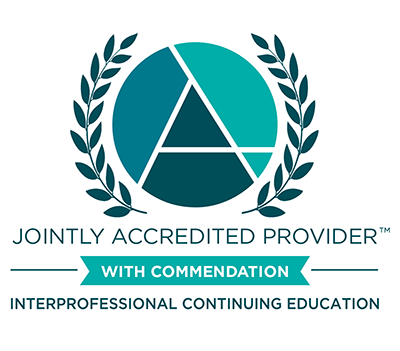 | In support of improving patient care, the University of Wisconsin–Madison ICEP is jointly accredited by the Accreditation Council for Continuing Medical Education (ACCME), the Accreditation Council for Pharmacy Education (ACPE), and the American Nurses Credentialing Center (ANCC) to provide continuing education for the healthcare team. |
Credit Designation Statements
American Medical Association (AMA) The University of Wisconsin–Madison ICEP designates this live activity for a maximum of 6 AMA PRA Category 1 Credits™. Physicians should claim only the credit commensurate with the extent of their participation in the activity. | |
American Nurses Credentialing Center (ANCC) The University of Wisconsin–Madison ICEP designates this live activity for a maximum of 6 ANCC contact hours. | |
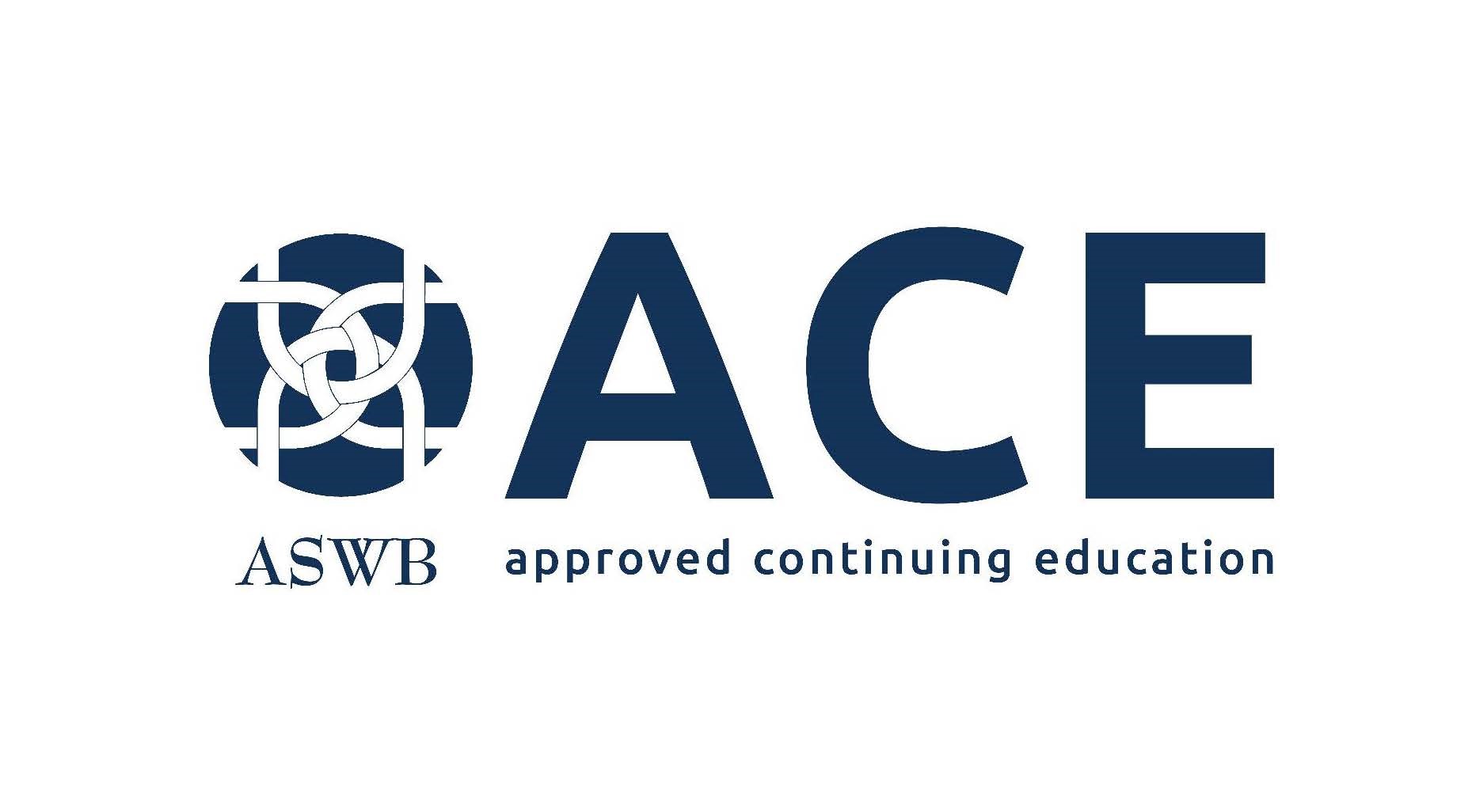 | Association of Social Work Boards (ASWB) Approved Continuing Education (ACE) As a Jointly Accredited Organization, the University of Wisconsin–Madison ICEP is approved to offer social work continuing education by the Association of Social Work Boards (ASWB) Approved Continuing Education (ACE) program. Organizations, not individual courses, are approved under this program. Regulatory boards are the final authority on courses accepted for continuing education credit. Social workers completing this course receive 6 general, live continuing education credits. |
 | American Psychological Association (APA) Continuing Education (CE) credits for psychologists are provided through the co-sponsorship of the American Psychological Association (APA) Office of Continuing Education in Psychology (CEP). The APA CEP Office maintains responsibility for the content of the programs. |
Continuing Education Units The University of Wisconsin–Madison, as a member of the University Professional & Continuing Education Association (UPCEA) authorizes this program for .6 continuing education units (CEUs) or 6 hours. |
Available Credit
- 6.00 AMA PRA Category 1 Credit™
- 6.00 ANCC Contact Hours
- 6.00 APA CE Credits
- 6.00 University of Wisconsin–Madison Continuing Education Hours
- 6.00 Approved for AMA PRA Category 1 Credit™
Registration for this activity can only be completed through the ICEP Learning Portal. Attendee registrations made through any other sites cannot be honored. UW-Madison ICEP is not able to refund fees paid through unaffiliated registration sites, such as eMedEvents.com, MedConfWorld.com, EventEgg.com, and 10times.com. Please report any unauthorized websites or solicitations for registrations to [email protected].
Cancellation and Refund Policy
Requests for cancellation must be submitted in writing to [email protected]. Cancellation requests received at least 96 hours prior to the conference will allow a full refund except for the nonrefundable processing fee of $50. No refunds will be made for cancellations received less than 96 hours prior to the activity start date.
Questions
For questions about registration, please email [email protected]. For general questions about the conference, please contact Jody Krainer at [email protected].
Program Changes
Emergency situations occasionally occur and may necessitate topic or speaker changes. The University of Wisconsin School of Medicine and Public Health and the University of Wisconsin–Madison ICEP reserve the right to alter or substitute a topic or speaker without prior notification.
Accessibility
We value inclusion and access for all participants and are pleased to provide reasonable accommodations for this event. Please contact [email protected] as soon as you can to make a reasonable accommodation request.

 Facebook
Facebook X
X LinkedIn
LinkedIn Forward
Forward